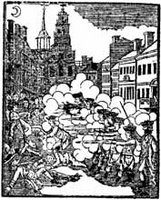Lost Youth Week Begins with Edward Garrick
 I’ve decided to make this “Lost Youth Week” at Boston 1775, talking about some young people in Revolutionary Boston whom I’d really, really like to find in the historical records. The documentation for youths of working age is even more spotty than the records of adult men since they often left their families but still didn’t pay taxes, own real estate, join churches, or advertise their services. (Boys may be easier to track than adult women, however, since they had a wider range of given names, and they didn’t change their names over their lifetimes.)
I’ve decided to make this “Lost Youth Week” at Boston 1775, talking about some young people in Revolutionary Boston whom I’d really, really like to find in the historical records. The documentation for youths of working age is even more spotty than the records of adult men since they often left their families but still didn’t pay taxes, own real estate, join churches, or advertise their services. (Boys may be easier to track than adult women, however, since they had a wider range of given names, and they didn’t change their names over their lifetimes.)
My first lost youth is Edward Garrick, apprentice to barber John Piemont in 1770. On the night of 5 Mar 1770, he said something cheeky that Pvt. Hugh White didn’t like. White called Edward over to the sentry box near the Customs House and clonked him on the head. That started the cycle of violence on King Street that ended in the Boston Massacre.
That fall, Edward testified at the trial of Capt. Thomas Preston. Some other apprentices, such as Bartholomew Broaders, mentioned him in their own testimony. Those depositions and lawyers’ notes from the trial supposedly preserve some of Edward’s own words. But then he disappears from the records.
If Edward Garrick was in his mid- to late teens in 1770, as his behavior indicates, then he would have been in his twenties during the Revolutionary War, and thus the right age to serve in the army. But he’s not listed clearly in Massachusetts Soldiers and Sailors in the War of the Revolution. Did his experience in 1770 commit him to the Patriot cause?
I haven’t found any mention of Edward Garrick (or Gerrish, as some people wrote down his name) in the surviving records of the churches of Boston, the Overseers of the Poor, or the newspapers. I’d especially like to find a birth or baptism date for the lad since that would shed a little more light on the dispute on King Street. Boys could go to work as early as about eight years old, and they remained “boys” in the eye of the law until they were twenty. Pvt. White could therefore have been facing a little boy or a young man taller than he was. As I said above, everyone assumes Edward was in his mid- to late teens, but we don’t know.
It’s possible Edward Garrick was born outside Boston; came in to train as a barber, as Ebenezer Fox did during the war; then went back to his home town after the war began. In which case, he could turn up in some rural church records. Anyone?

3 comments:
Edward Garrick... I was watching a US history video in my Current events class. And when i saw the reanactment of him... I can't explain it. I knew the story and even more that wasn't shown. I feel like i knew him in a past life. Like i was in a relationship with him. Is it possible???
Well, if you ever make a connection, ask him where he went to after 1770.
Lol
Post a Comment